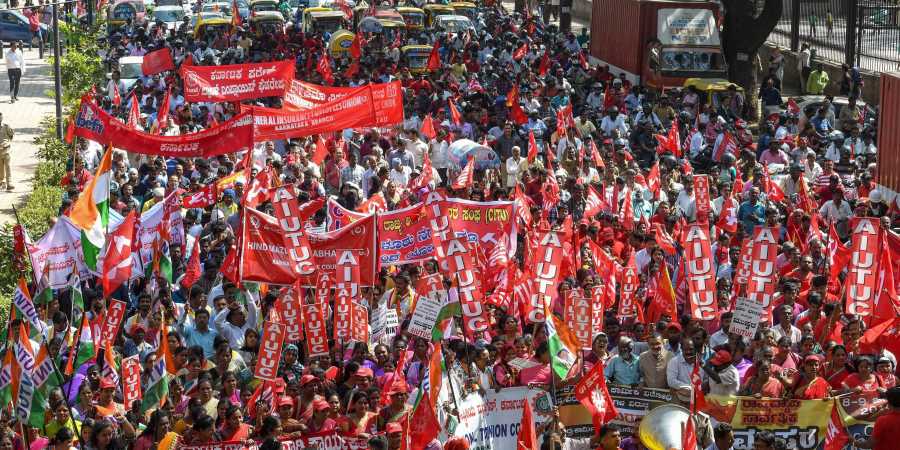
Trade unions, bank employees go on nationwide strike to decry labour laws

At least 10 central trade unions and many bank employees’ unions will go on a nationwide strike on Thursday (November 26), opposing disinvestment in profit-making state-run enterprises and the recently approved labour and farm reforms.
Hundreds of affiliate unions in states, industrial clusters, coal mines, steel factories, manufacturing belts as well as informal workers’ groups, farmers’ groups and government scheme workers are set to join the nationwide protest.
In a statement on Wednesday, a joint platform of 10 central unions said all preparations have been done as more than 25 crore workers are expected to participate in the strike across the country.
The move is likely to impact banking and insurance transactions, and lead to blockages in transport systems and road movement other than person-day loss and production loss in companies.
“Formal sector workers, government employees, informal workers and farmers are coming together for this nationwide strike. It will be decentralized with a lot of action at the state and district level,” said Amarjeet Kaur, general secretary of the All India Trade Union Congress (AITUC), a central union.
Also read: Giving banking licenses to corporate houses retrograde: CPI
“The suffering of people and government inaction is forcing us to mobilize people—they will take action against us, but we are ready to fight it out,” Kaur said.
The All India Bank Employees Association said in a statement: “Have private banks contributed for employment generation, direct and indirect, in the massive way, the nationalized banks have done? In such employment in nationalized banks, there is reservation policy. If banks are handed over to private corporate houses, will this reservation policy not get affected?”
However, Cyclone Nivar is likely to mar the worker mobilisation and street protests in Tamil Nadu, Puducherry and Andhra Pradesh.
COVID-19 restrictions in some states like Delhi will also pose a challenge.
Delhi Police has already told protesting farmers coming in from Haryana and Punjab to not enter Delhi for the strike, and has warned that any violation will lead to legal action.
“We have information that Haryana and Uttar Pradesh will try their best to stop the farmers and workers from entering Delhi. They are already stopping in Haryana, but our people have no problem—we will sit on the border and all industrial clusters wherever they stop us,” Kaur said.
“Covid-19 was not a restriction while carrying out election rallies but it’s a problem when workers protest. We understand the politics of some governments but it won’t hinder us,” she added.
The workers are also pressing a wider demand for more jobs, and cash transfers of ₹7,500 per month for all poor families, 10 kg free ration per person per month to all needy, expansion of the national rural employment guarantee scheme to provide 200 days’ work in a year in rural areas and the extension of employment guarantee to urban areas.
They are demanding the withdrawal of all “anti-farmer laws and anti-worker labour codes, stop privatization of public sectors, including the financial sector, and stop the corporatization of government-run manufacturing and service entities like railways, ordnance factories, ports”.
They are also demanding the restoration of the earlier pension facility by scrapping the contributory pension of the National Pension System (NPS).
The Bharatiya Mazdoor Sangh, a central union affiliated to the ruling Bharatiya Janata Party and Rashtriya Swayamsevak Sangh, however, is not participating in the nationwide strike.


